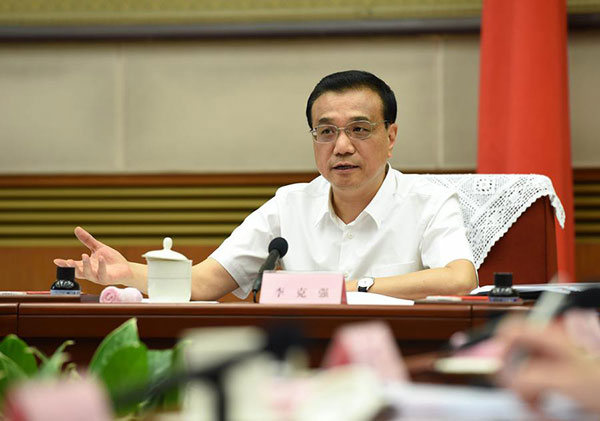 |
|
Chinese Premier Li Keqiang speaks at a conference in Beijing, June 12, 2015. [Photo/Xinhua] |
China's premier has formulated a series of amendments to his blueprint for the economy as he attempts to boost growth and strengthen domestic demand, Zhao Yinan reports.
When Premier Li Keqiang greeted New Zealand Governor-General Jerry Mateparae in a Uygur-style room in the Great Hall of the People in Beijing last week, he probably didn't expect the high-level bilateral talks to devolve into a question and answer session about China's economic reforms.
While it's customary for international leaders to inquire about the latest news on the Chinese economy-it's an issue that has ramifications for all nations, after all-Mateparae probed a little deeper below the surface of GDP growth and discussed the underlying health of the economy.
Li's message to his guest, and the world at large, was that implementing reforms is a tough, multifaceted job, but the government is determined to push the changes through, including major reforms such as the reduction of the government's role in the economy and improvements to the financial sector.
Li began restructuring the world's second-largest economy when he assumed office in 2013. The reforms, their progress and the chances of success, are at the top of the list of concerns for the central leadership-and other world leaders, given the strength of the Chinese economy in an increasingly interlinked and globalized world.
Li is almost halfway through his first five-year term and the reforms are continuing. So far, the signs have been encouraging. In the first half of the year, the economy showed signs of growing robustness, with better-than-expected growth of 7 percent.
Momentum expected
Zhao Zhenhua, an economist at the Party School of the Central Committee of the Communist Party of China, said consumer prices are still too low. However, the economy is stabilizing after a tough start to the year, and stronger momentum can be expected in the second half because pledged investment is now feeding into the economy, and the freshly streamlined bureaucracy has started to have a positive impact on business, Zhao added.
That success has been hard-won, especially given the disappointing economic data that confronted Li in the early part of the year, Zhao said. The credit-and investment-fueled economy seemed to have lost steam-the volume of rail freight, for example, fell by 9 percent in the first quarter. Some observers saw the decline as a blow to the premier, because Li, who holds a doctorate in economics, used that figure to gauge economic performance when he was a provincial governor.
Furthermore, China's economic difficulties have been compounded by a hands-off approach in terms of local government administration, and by stronger environmental awareness among the public, which has resulted in a number of controversial projects being abandoned.
A sweeping anti-graft campaign has also produced contrasting results by dissuading corrupt officials from illegal practices, but also by making some officials reluctant to do their jobs for fear of being accused of abuse of power.
High-energy-consuming factories have been phased out to cut excessive industrial capacity, which resulted from a frenzy of investment during the 2008 global financial crisis. Last year, nearly 10,000 businesses in Hebei province were forced to shut down.
A closer look at this year's State Council executive meetings, a weekly working conference presided over by the premier to discuss essential issues with members of his Cabinet, provides an insight into Li's methods.
By the start of this week, Li had held 17 executive meetings that mainly focused on four areas of reform.
